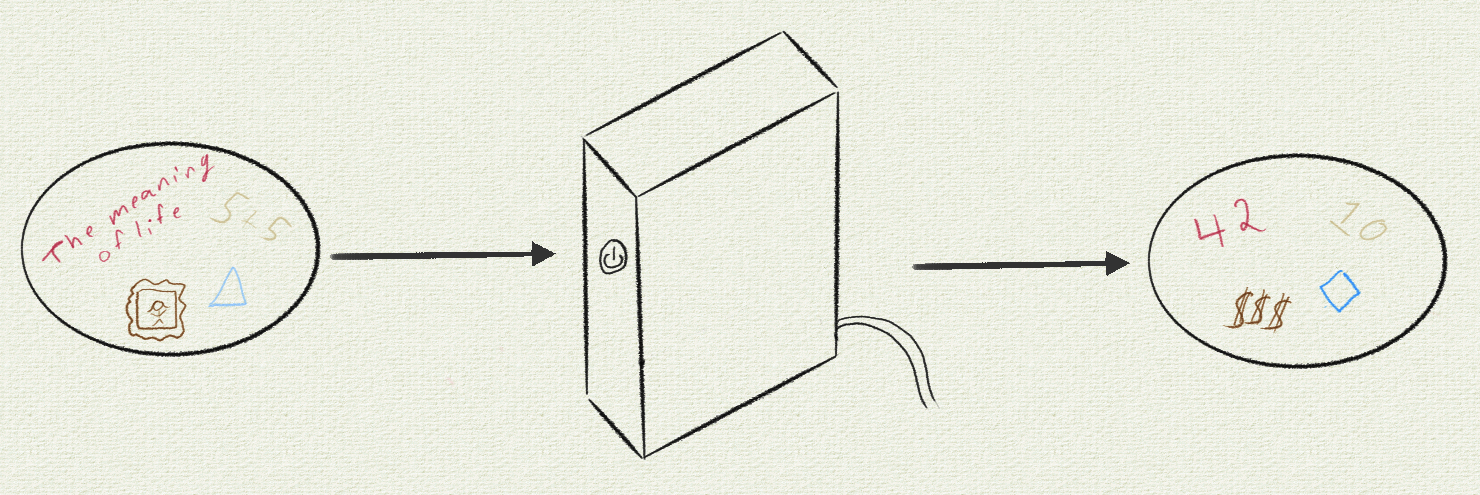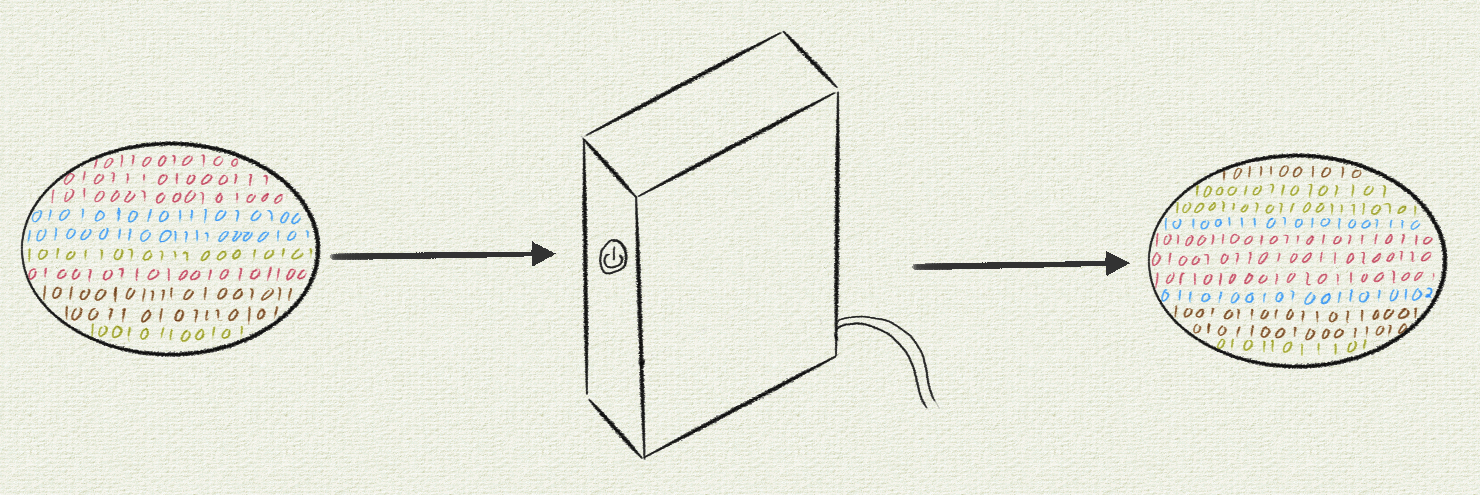Why Quantum Computing: Particles
It sounds trivial but it’s not. My very first reason for even being tempted to look to my darling quantum mechanics as a tool for computing is the fact that the quantum world is one of discretization—particles for sure, but also pseudo-particles, energies, momenta, so on and so on. We were never guaranteed life should be this way but it is, and that’s important.
So let’s go.
If we’re going to talk about computing quantumly, we should probably be clear about what computing is first.
What is computing?
The general concept of “computing” is actually surprisingly ill defined in a technical sense so let’s go by instinct. It’s the 21st century, we all know about computers: metal boxes of magic designed by nerds that can do just about anything with data, text, audio, graphics, and video. But in fact 99.999% of that magic is just engineering, just improving the implementation of the same basic principle behind the primitive early computers that took up entire rooms to push out a few choice numbers. That principle is “input -> machine -> output.”

That is, “computing” (or maybe better universal computing) is the idea of a machine that answers questions, a kind of mechanical oracle. Ask a question (give it input) and it (the machine) will give you the answer (output). The information age came about because a) some very smart people realized that virtually all practical questions we can ask can be represented discretely and algorithmically, and b) some other very smart people realized that a box of on/off switches can be arranged to answer any discretely posed question.

Discretion is Key
This discreteness thing is important: modern computing is built with Lego, not clay. This is partly a physical necessity1 but just as much so a practical one. Don’t lie; if your life depended on it you’d much rather have to build something out of lego than clay, and engineers and mathematicians agree too. Switches are really easy to build and work with, and that fact is what has made modern technology possible.
You Know What Else is Discrete?
If you look for smaller and smaller Lego, you eventually find yourself in a very unintuitive place. The very small and the very precise understand very different rules from the rest of us, they are directly2 governed by the laws of quantum mechanics. Right there is already the first reason to at least involve quantum mechanics in the discussion of computing: in the never-ending quest to build smaller and smaller devices, we inevitably start to encroach on the quantum realm, so we might as well see if it wants to get involved at a higher level too.
But running into quantum things as we shrink computers is a blessing as much as it is a curse. The quantum world contains discrete things in the form of individual particles, but it also discretizes things we always thought were smooth, like energy and angular momentum. Each individual electron or particle of light (photon) comes built in with its own fixed, discrete unit of angular momentum (called spin), and when bound together in atoms, molecules, lattices, cavities, or all sorts of different places, things like energies, positions, and momenta all can be found to be broken into fixed chunks (called quanta3 in the biz).
There’s no physical or philosophical reason why Nature was forced to be this way, she could just as easily have turned out to be smooth as silk at the most fundamental level. This is something that’s happened before: colours turned out to be a spectrum, and it happens all the time in social and biological sciences. But the quantum world went the other way and chopped things up and we should be grateful. With so many options we’re just spoiled for choice in looking for quantum transistors—here are a few options under active consideration:
- Superconducting circuits (Google, IBM, Rigetti, many others)
- Neutral atoms (Pasqal, Atom Computing, QuEra)
- Trapped ions (IonQ, Quantinuum, Quantum Factory)
- Photonics (Xanadu, PsiQuantum)
- …
For those new to the topic, in the field they call these options qubits as a portmanteau of quantum and bit.
Domestic Quanta
Quantum things are actually all around us already. Our oldest quantum friend is good old fashioned light, and it uses its lumpiness all the time. You radiate in the infrared because light’s energy is in its frequency not intensity, your phone’s camera works by absorbing discrete chunks of that energy, fluorescent things fluoresce because quanta of light excite individual electrons, etc., etc. Fluorescence is a great visual example: watch as this tonic water glows only under a UV light because electrons can only eat discrete chunks of light with sufficiently short wavelengths.



So Reason #1
There are lots of quantum options for regular computing. The quantum world is rife with discrete, manipulable things that we can use to encode data and algorithms just like we have done for 80 years now. This fact is a bridge between quantum physics and digital computers; at the very, very least it means the coast is clear to keep shrinking regular computers right down to the level of subatomic particles, but since we’re going there anyway… we might as well see if the quantum world has anything else to offer computing.
In the next part, we’ll look at a fundamental property of quantum mechanics that is reminiscent of regular computation theory, but is ever so subtly (and potentially powerfully) different.
Pre-emptive Complaints
Footnotes
-
Turing even mentioned it in his original thesis, a computer built on real numbers would require an infinite amount of memory. ↩
-
Indirectly we all are, but our big numbers and imprecision make us think very differently from the humble electron and photon. ↩
-
In fact the reason we call it “quantum mechanics.” Quantum is a Latin word for an “amount,” and early papers on the the topic referred to elementary amounts, or elementary quanta, of various things, like energy or electricity. Only the “quantum” part stuck for the obvious reason that it sounds neat-o. ↩